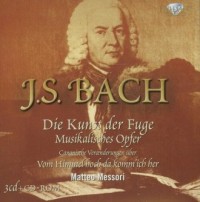
| Dane szczegółowe: | |
| Wytwórnia: | Brilliant Classics |
| Rok wyd.: | 2011 |
| Rodzaj nośnika: | CD |
| EAN: | 5028421940618 |
| Data: | 2013-05-06 |
pozycja niedostępna
×
Opis albumu:
J.S. Bachs great masterpiece, The Art of Fugue, was incomplete when the composer died in 1750, and he left no indications whatsoever for its instrumentation. Since then there has been much debate on the subject, but we now know that it was written as a practical work intended for keyboard performance exploring the contrapuntal possibilities within one subject. Bach also adopted the same compositional-notational method for the beautiful and profound organ cycle Canonic Variations on the Christmas Carol and the brilliant six-voice Musical Offering, created for King Frederick II of Prussia, which are also heard in this 4-CD set. Also included is the fragment of the incomplete three part final fugue BWV1080/19, whose inclusion in The Art of Fugue is disputed amongst music scholars. The renowned Italian harpsichordist, organist and musical scholar, Matteo Messori, has won awards for his recordings of Bach. Messori has gone back to original sources and letters relating to these works, and taken account of the most up-to-date research and interpretative knowledge, in order to reveal Bachs true intentions for his music, and to give as authentic a performance as possible. Messori performs on the harpsichord and organ, and is joined by Italian early music ensemble Cappella Augustana, featuring Luigi Mario Lupo (transverse flute), Luca Giardini (violin), ajnd Marco Testori (cello). Matteo Messori on this recording: - The new recording presents the four principal contrapuntal works of the last decade of Bachs life. Four, because Matteo Messori separates the hypotheticalquadruple" incomplete fugue from the cycle called later (probably on Marpurgs suggestion)Kunst der Fuge". - The performer, following recent researches, considers that Fugue as a piece conceived to develop three - not four - subjects, which would have never included the subject on which the contrapuntal variations cycle is based on, and therefore a piece which is unrelated to the cycle. The Fugue was probably meant to be a great Ricercare, whose third and last subject introduced the name of Bach, and was designed for the Society founded by the pupil Mizler. - For the first time a harpsichord built in accordance with the historical Thuringian praxis provided with a 16 stop and with the so-called Bachs disposition is used in some pieces. According to a recent study published by the performer in the Bach-Jahrbuch 2010, it was Bach himself who designed an instrument with a similar disposition, equipped besides with a large Pedal-harpsichord, for his performances with the Collegium Musicum in Leipzig. - It is the first world recording in which all the canons from the Musikalisches Opfer (apart from those which bear a specific destination indicated by Bach himself) are played on a harpsichord solo. - The canonic variations were performed on the impressive Trost organ (1724-1730) in the Stadtkirche in Waltershausen. - A detailed booklet (CD-ROM) written by the performer gives more information on the performance issues and choices and on the structure and history of the works, according to the most updated scientific findings. About Matteo Messori: - His recording of the third part of the Klavierübung by Johann Sebastian Bach on three historical Thuringian, Silesian and Saxon organs (one inaugurated by Bach himself) has gained the prize5 de Diapason" in March 2008 from the French magazine Diapason. - He was born in Bologna where he studied Organ and Counterpoint, graduating with the best of marks and the summa cum laude. He studied Harpischord under the harpsichordist, organist, conductor and singer Sergio Vartolo at the Conservatories of Mantua and Venice, graduating as well with the best of marks and the summa cum laude. In addition, he studied Musicology at the University of his native city, Bologna.Muzyka „Die Kunst der Fuge” - oprawa CD - Wytwórnia: Brilliant Classics.

